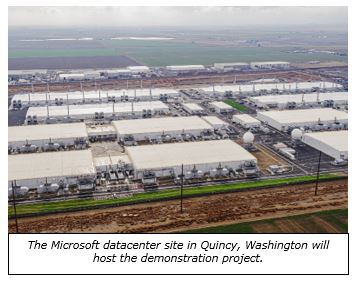VANCOUVER, CANADA – Ballard Power Systems (NASDAQ: BLDP; TSX: BLDP) today announced that the company has launched a three-year project through a collaboration with Caterpillar Inc. (NYSE: CAT) and Microsoft (NYSE: MSFT) to demonstrate a power system incorporating large-format hydrogen fuel cells to produce reliable and sustainable backup power for data centers. The project is supported and partially funded by the U.S. Department of Energy (DOE) under the H2@Scale initiative and backed by the National Renewable Energy Lab (NREL).
 Caterpillar experts in advanced power technologies, controls and system integration are working alongside Microsoft experts in data center design and Ballard experts in fuel cell design, to demonstrate a 1.5 MW backup power delivery and control system that would meet or exceed the high expectations set by current diesel engine systems, while achieving a significantly reduced emissions profile.
Caterpillar experts in advanced power technologies, controls and system integration are working alongside Microsoft experts in data center design and Ballard experts in fuel cell design, to demonstrate a 1.5 MW backup power delivery and control system that would meet or exceed the high expectations set by current diesel engine systems, while achieving a significantly reduced emissions profile.
Ballard will provide an advanced, 1.5 MW ClearGenTM-II hydrogen fuel cell power generator. As the prime contractor on the project, Caterpillar is providing the overall system integration, power electronics, and controls that form the central structure of the power solution, which will be fueled by low-carbon-intensity hydrogen. Microsoft is hosting the demonstration project at a company data center in Quincy, Washington. NREL is performing analyses on safety, techno-economics, and greenhouse gas impacts.
“At Caterpillar, we focus on supporting our customers with reliable, resilient and economical power solutions while achieving their climate-related goals,” said Jason Kaiser, Vice President of Caterpillar Electric Power. “This hydrogen fuel cell demonstration project enables us to collaborate with industry leaders to take a large step toward commercially viable power solutions that also support our customers in making their operations more sustainable.”
“We continue to invest in research and advanced development in hydrogen fuel cells as one of the various pathways toward our commitment to be carbon negative by 2030,” said Christian Belady, Distinguished Engineer and VP, Advanced Development, Cloud Operations + Innovation at Microsoft. “This latest project with Caterpillar will provide valuable insights into how to leverage hydrogen fuel cells for backup power in our datacenters at scale.”
“We are excited to be collaborating with a complementary team of global industry leaders on this important demonstration project,” said Randy MacEwen, Ballard’s President & CEO. “The results of this project will provide key insights into the capability of fuel cell systems to scale and serve multi-megawatt data centers. The project will also explore the scalability of fuel cell systems powered by low carbon-intensity hydrogen from cost and performance perspectives. Ballard’s industry leading PEM technology is well suited for customers undergoing energy transition and requiring high power backup applications featuring its quick start up ability, proven durability, and load following capability.”
About Ballard Power Systems
Ballard Power Systems’ (NASDAQ: BLDP; TSX: BLDP) vision is to deliver fuel cell power for a sustainable planet. Ballard zero-emission PEM fuel cells are enabling electrification of mobility, including buses, commercial trucks, trains, marine vessels, passenger cars and forklift trucks. To learn more about Ballard, please visit www.ballard.com.
Forward-looking statements
This release contains forward-looking statements concerning the development and delivery of fuel cell products, and the benefits and anticipated market adoption of them. These forward-looking statements reflect Ballard’s current expectations as contemplated under section 27A of the Securities Act of 1933, as amended, and Section 21E of the Securities Exchange Act of 1934, as amended. Any such statements are based on Ballard’s assumptions relating to its financial forecasts and expectations regarding its product development efforts, manufacturing capacity, and market demand. For a detailed discussion of the factors and assumptions that these statements are based upon, and factors that could cause our actual results or outcomes to differ materially, please refer to Ballard’s most recent management discussion & analysis. Other risks and uncertainties that may cause Ballard’s actual results to be materially different include general economic and regulatory changes, detrimental reliance on third parties, successfully achieving our business plans and achieving and sustaining profitability. For a detailed discussion of these and other risk factors that could affect Ballard’s future performance, please refer to Ballard’s most recent Annual Information Form. These forward-looking statements are provided to enable external stakeholders to understand Ballard’s expectations as at the date of this release and may not be appropriate for other purposes. Readers should not place undue reliance on these statements and Ballard assumes no obligation to update or release any revisions to them, other than as required under applicable legislation.
Acknowledgement
This material is based upon work supported by the U.S. Department of Energy’s Office of Energy Efficiency and Renewable Energy (EERE) under the Hydrogen and Fuel Cell Technologies Office, H2@Scale Initiative, Award Number DEEE0009252. The views expressed herein do not necessarily represent the views of the U.S. Department of Energy or the United States Government.
Further Information:
Kate Charlton – VP Investor Relations +1.604.453.3939, media@ballard.com or investors@ballard.com

